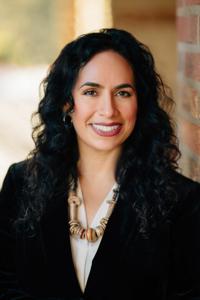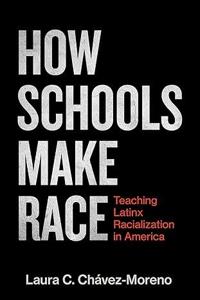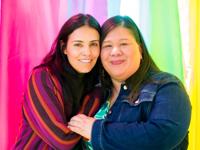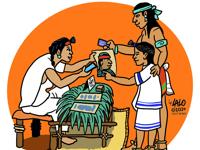
An exploration of how schools shape racial identities and hierarchies through bilingual education and institutional practices, “How Schools Make Race” is a critical examination of the subtle and overt ways education contributes to societal racialization and inequities.
As a former Spanish teacher, Laura C. Chávez-Moreno often witnessed her students grappling with racial identity and cultural expectations in ways she wasn’t fully prepared to address. Her students’ comments and questions opened her eyes to the complexities of racialization within the school system. She recalls the challenges of navigating these moments, feeling the weight of her responsibility as an educator to address these issues thoughtfully.
Chávez-Moreno’s new book, “How Schools Make Race: Teaching Latinx Racialization in America,” draws from these formative experiences, blending them with years of academic research to unpack how schools subtly shape racial identities, especially for Latinx students.
The book addresses sensitive issues, like the limitations placed on teachers in discussing race openly, the diversity (or lack thereof) within bilingual teaching staff, and the challenges faced by Latinx students in predominantly white school systems.
Chávez-Moreno’s decision to avoid naming specific schools or states in her research highlights the universal nature of racialization in education. As she points out, the underlying process of racial identity formation is a nationwide phenomenon, not confined to any particular region. This broad perspective underscores the pervasiveness of racialization in shaping students' identities, an issue Chávez-Moreno believes requires urgent attention from educators, administrators, and policymakers alike.
This interview has been edited for length and clarity.
This book essentially covers the time when Donald Trump was elected president in 2016 and fast forward to now. The book is out and we live in a reality where Trump will be president again. So I simply want to ask you, what does the re-election of Donald Trump mean for this type of research and future work?

Laura C. Chávez-Moreno, a former educator and researcher, sheds light on the hidden impacts of race in education. (Photo provided by Laura Chavez-Moreno.)
I'm not really sure how I could answer that because it's still... I was walking yesterday, and I was trying to process, thinking, "I can't believe this is happening again and worse." It's not going to be the same. It's going to be worse. I really don't know how to answer that, besides the fact that, like you mentioned, I was in classrooms in a Midwest swing state [in 2016] and heard things like students saying, "Miss, I'm not coming tomorrow; I'm going to be deported." It's interesting because last week, I was in Arizona doing a research study, and exactly the same phrase was used. So, it’s deeply saddening, and I haven't fully processed it.
Could I add, though, being in the classrooms in Arizona versus being in the classrooms in the previous study in the Midwestern state, I feel like, can I go back to the other classrooms? Because in Arizona, teachers were basically forbidden. One of the teachers told me we were muzzled to talk to our students about the election. So there was a lot of fear, and that fear wasn't addressed, so there was this stifling silence in the schools.
When I began reading the book, I thought this was going to be a message to teachers and their pedagogy and what things should and shouldn't be done in the classroom. But I found that your book isn’t just about teacher pedagogy but rather how institutions shape these racial identities and social structures.
Thanks for noticing that the book isn’t trying to dictate what teachers should or shouldn’t do. It is about showing how, often in hidden ways, schooling institutions create these ideas about racial categories. But to clarify, I’m less focused on individual identity formation and more on the formation of groups. That’s a key distinction.
In the book, you spend a significant portion defining terms like race, ethnicity and racialization. Why was it necessary to invest so much time in clarification?
That's kind of the business of academia. As scholars, we need to explain what we mean by terms instead of assuming shared understanding. For example, if I use the term "Latinx" without explanation, readers might misinterpret its meaning. Being explicit about concepts helps guide understanding, especially when dealing with theory. It's interesting that you notice that because that's actually something that I also advocate in my other work, for scholars to be clear about how they conceptualize specific terms and concepts.
In the book, you mentioned using "Latinx" for political reasons.
So, I first heard Latinx when I was a doctoral student, and I liked it because I saw it as a gift from the queer and trans communities to challenge the gender binary and patriarchy. As time went on, I started hearing people use “Latine,” but the reasons I heard for using “Latine” weren’t very appealing to me. As I kept reading other authors and their interpretations of the “X” in Latinx, I came across Claudia Milian’s book “LatinX.” In that book, she mentions that one of the meanings of the “X” could be crossing out “Latin,” a word rooted in colonialism and Europe. I loved that idea.
This distinction is crucial because racialization is highly context-specific. For example, in Guatemala, there is a racialized group called Ladino (not Latino). If someone who identifies as Ladino in Guatemala moves to the U.S., that label doesn’t translate or hold the same meaning here. Similarly, someone from Latin America identifying as “Latino” might find that the U.S. context racializes the term differently, and it doesn’t carry the same understanding.
So, when I use “Latinx,” it signals to my readers that I’m talking about a racialized group within the specific context of the U.S., not about Latin Americans as a whole. That’s why the “X” is meaningful—it serves as a marker of this distinction.
Does your use of "Latinx" come up in your teaching?
Oh, definitely. I’ve noticed a trend among my students where they often use "Latine," and they’re curious about why I use "Latinx." I explain my reasons to them, but I make it clear: I’m not trying to convince or convert them to use "Latinx." I tell them, "This is why I use it, but it’s totally fine if you choose to use something else in your work." It’s something I bring up to share my perspective, but I emphasize that they’re free to have their own reasons and use whichever term they prefer.
You obviously speak to educators and students but something I found particularly interesting is that you also address parents. I see this text as not only essential for educators but also potentially valuable for parents. What should parents know about how schools shape racial identities?
I did interview parents for the study, and I noticed that parents had different ideas about what should be taught in schools—which, of course, isn’t surprising. But for teachers to engage in this kind of work, there needs to be community support and parents are a key part of that community. It’s crucial to remember their role in supporting teachers as they undertake this work. By "this type of work," I mean helping students develop critical racial consciousness and addressing questions about race explicitly. Schools, as I argue in the book, already teach about race in implicit ways. However, we must also engage with race explicitly, advancing anti-racist thinking and critically examining race as a construct. Parents’ support is essential in fostering this kind of education.
How can parents advocate for a more equitable and inclusive education for their children?
One of the things I noticed in my study was a meeting, maybe “Town Hall” is too formal a term, between parents, students, and teachers of the bilingual program. They met on a Saturday morning to discuss the program’s history, importance and challenges, as well as to hear from both students and parents. What struck me most was that parents were very adamant about teachers needing to be 100% bilingual and highly proficient in Spanish. Their focus was entirely on language proficiency. I also heard similar sentiments from students I interviewed, some of whom chose not to participate in the program. For example, one student said, “I don’t want to be in the program because my teacher pollutes my Spanish.”
I mention this example because, during that meeting, no parent brought up the importance of teachers developing students’ critical consciousness. The focus was solely on language—ensuring students learned English and spoke perfect Spanish. I think this emphasis stems from a stigma about students being viewed as “pocho” or not having perfect Spanish.
To answer your question about how parents can advocate, they should show up at these meetings and expand the conversation. Of course, they can express the importance of bilingualism, but they should also emphasize the need for teachers to develop student awareness of societal injustices and their critical consciousness. That would be a significant step forward.
I was also intrigued by the makeup of the teachers you chose, or who were selected, and the very interesting group of people that emerged. One seemed almost overtly racist, and it was fascinating to see how race shaped their perspective. The gender makeup of the educators was also notable.

One of the things I found interesting was the very small number of Latino, Latina or Latinx teachers in the program. The program had 15 teachers across two schools that I observed. Not all of them participated in the study, but I believe it was around 12 or 13 who did. However, the majority of the teachers were white or self-identified as white, which stood out to me. It was notable that, in a bilingual program in a Midwestern state, the teaching staff was still predominantly white. I say "still" because this pattern was consistent with what I observed outside the program as well.
Another interesting point was who was leading lessons that challenged racism and addressed social justice. As I mentioned, there were very few Latinx teachers in my study, so I didn’t have many opportunities to observe whether they would approach these topics differently. There was also an immigrant teacher from Spain who incorporated some of these ideas in their classroom.
This study wasn’t designed to assess whether white teachers are more critically conscious than Latinx teachers. What I did notice, in terms of patterns, was that the teachers leading critical lessons were mostly white. That’s why I don’t find that particular observation especially compelling.
Why did you avoid naming specific schools or states in the book?
There are very few bilingual programs at the secondary level, especially in middle and high schools. That's why I didn't name the state but it's also something I realized after the fact. I also appreciate that choice because I wasn't just focusing on one specific place; I’m talking about something that happens in schools everywhere. All schools in the U.S., in my opinion, contribute to shaping ideas about race. Because schools are central in our racialized society, they maintain and sometimes challenge ideas about race. They can reinforce these ideas or offer new perspectives, but they shape how we think about racial groups. So, while I don’t specify the state, school or city, I wanted to provide an example that helps us think about how this process works more broadly. It may not look exactly the same in every place, but if we think about how schools make race, it’s helpful to recognize that this isn’t just something that happens in one city. It could be anywhere in the U.S.
Would that at all be influenced by the fact that, to me, it's interesting you say this can happen anywhere in the U.S., regardless of the specific makeup of a city or state? The immediate question that comes to mind is that not all cities and states are the same, and not all educators have the same demographic makeup. So, I’m kind of challenging that idea: what does it say about the institutions pushing for a more diverse group of educators and students? When you say this can happen anywhere, does that mean the work being done to increase diversity has a broader significance?
What I mean by saying this can happen anywhere is not that the specifics are the same, but that the process of racialization happens everywhere. The making of race and the teaching of race occur everywhere. It’s not about the particulars; it’s about the broader process. I assume we live in a racialized society, so even if this were Alaska, Hawaii or Florida, the U.S. has undergone a process of racializing its groups. The specifics could vary, different states might have different laws or approaches, but schools are teaching about race, whether implicitly or explicitly. The lessons may differ, but they’re still about race.
For example, a school that offers ethnic studies and takes an anti-colonial, anti-imperialist stance is still teaching about race, even if the content and perspective differ. So, when I say this process happens everywhere, I’m talking about the underlying similarity, not the exact details.
I noticed that your educational background highlighted the importance of culturally relevant, race-conscious teaching. Why did your educational journey become so important to you that you wrote about it?
My background as an educator is shaped by political events in the U.S. For example, the banning of bilingual education in California and Arizona had a significant impact on me during my time as both a high school and undergraduate student. I had always planned to become a teacher, but at that point, I wasn’t sure whether I wanted to teach history or Spanish. When bilingual education was banned in Arizona, it really solidified my decision to become a Spanish teacher. I saw the ban as an attack on immigrants and the Latinx community, and that made it clear to me which path I wanted to pursue.
I saw language as a very important issue for the community, which is why I chose to teach Spanish. Even from that point, it was something that mattered deeply to me. But being a teacher also had a major influence on how I think about the book. When I was teaching, my students talked about race all the time, through jokes and casual comments, it was something that came up constantly. However, as a teacher, I didn’t always know how to address it in a productive or helpful way. Sometimes, I felt like I was teaching concepts but not scaffolding my students' thinking effectively. I’d either move too slowly or too quickly, and I wasn’t prepared to teach about these complex issues. As many people know, these are very sensitive and taboo topics, and you can get into a lot of trouble if you don’t handle them correctly. It takes a lot of bravery as a teacher, and sometimes I made big mistakes. But these experiences were also formative for me and helped shape how I think about these issues.
I want to focus on the recommendations you make in the conclusion of your book, particularly when you discuss embracing theory. I found it insightful when you mention that individual teachers don’t have all the answers. This really resonated with me because it highlights the vulnerability of educators and how that can be an asset.
One teacher I really admired shared that she knew she didn’t have all the answers, but she wanted to explore the issues with her students, and I truly admired that. It takes a lot of courage, and she was a very brave educator. Many of her lessons were meaningful to her students. I believe teachers can support each other by collaborating and sharing ideas for these kinds of lessons. I’m a strong advocate for taking an inquiry stance in teaching, which helps educators improve their own practices. I learned this approach from Professor Marilyn Cochran-Smith and her work with Susan Lytle. It involves teachers being systematic and intentional about examining their teaching in collaboration with others, looking at student work, discussing how to challenge students and exploring ways to expand their thinking.
The best teacher preparation, in my opinion, focuses on helping teachers feel supported and confident enough to take risks in the classroom. Vulnerability in teaching often means taking risks, so to foster this, teachers need ample support and proper training.
You can buy a copy of “How Schools Make Race: Teaching Latinx Racialization in America" here.














(0) comments
Welcome to the discussion.
Log In
Keep it Clean. Please avoid obscene, vulgar, lewd, racist or sexually-oriented language.
PLEASE TURN OFF YOUR CAPS LOCK.
Don't Threaten. Threats of harming another person will not be tolerated.
Be Truthful. Don't knowingly lie about anyone or anything.
Be Nice. No racism, sexism or any sort of -ism that is degrading to another person.
Be Proactive. Use the 'Report' link on each comment to let us know of abusive posts.
Share with Us. We'd love to hear eyewitness accounts, the history behind an article.